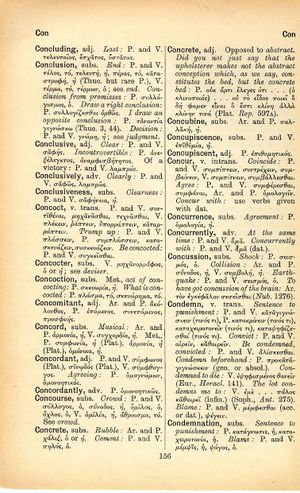conclusive: Difference between revisions
From LSJ
Περὶ τοῦ ἐπέκεινα τοῦ νοῦ κατὰ μὲν νόησιν πολλὰ λέγεται, θεωρεῖται δὲ ἀνοησίᾳ κρείττονι νοήσεως → On the subject of that which is beyond intellect, many statements are made on the basis of intellection, but it may be immediately cognised only by means of a non-intellection superior to intellection
(6_4) |
(D_2) |
||
| Line 10: | Line 10: | ||
{{Lewis | {{Lewis | ||
|lshtext=<b>conclūsīvē</b>: adv. [[concludo]], II. D.,<br /><b>I</b> in form of a [[conclusion]], conclusively, Cassiod. Inst. Div. Litt. 1 med.> | |lshtext=<b>conclūsīvē</b>: adv. [[concludo]], II. D.,<br /><b>I</b> in form of a [[conclusion]], conclusively, Cassiod. Inst. Div. Litt. 1 med.> | ||
}} | |||
{{Gaffiot | |||
|gf=<b>conclūsīvē</b>, en forme de conclusion : Cassiod. Inst. div. 1, p. 1112. | |||
}} | }} | ||
Revision as of 06:49, 14 August 2017
English > Greek (Woodhouse)
adj.
Clear: P. and V. σαφής.
Incontrovertible: P. ἀνεξέλεγκτος, ἀναμφισβήτητος.
Of a victory; P. and V. λαμπρός.
Latin > English (Lewis & Short)
conclūsīvē: adv. concludo, II. D.,
I in form of a conclusion, conclusively, Cassiod. Inst. Div. Litt. 1 med.>
Latin > French (Gaffiot 2016)
conclūsīvē, en forme de conclusion : Cassiod. Inst. div. 1, p. 1112.

